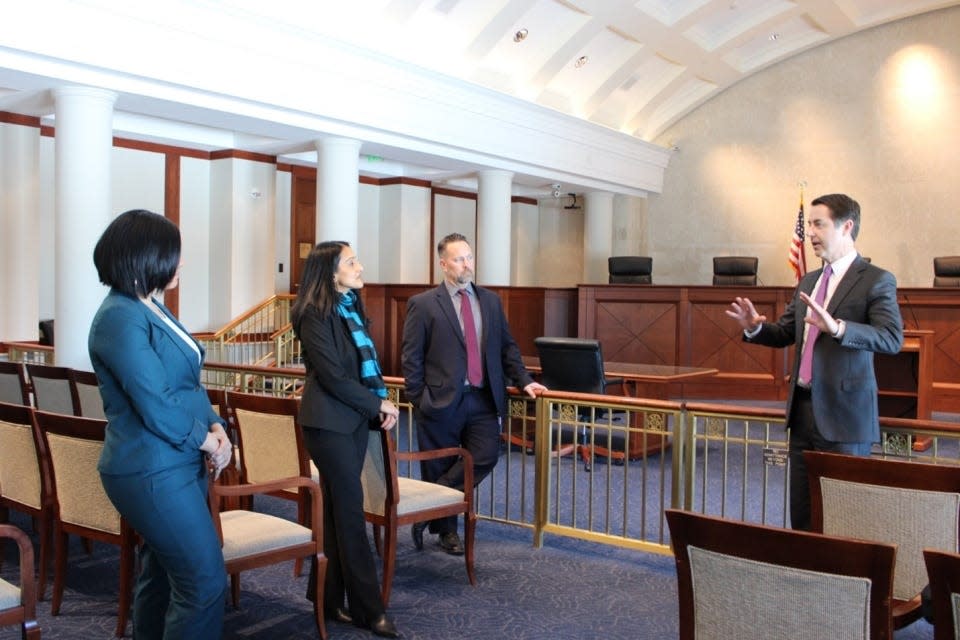Federal justice leaders announce plans to boost rural legal access in visit to Iowa

Federal officials visited Des Moines Tuesday to announce new plans to improve access to affordable legal services for Iowans, while also cautioning that the state may be requiring indigent defendants to pay more than they can afford for their state-appointed lawyers.
Associate Attorney General Vanita Gupta, the department's No. 3 official, and Office for Access to Justice Director Rachel Rossi made the announcement Tuesday in Des Moines. It was the final stop in a national tour to raise awareness and generate ideas to address the growing challenge of providing counsel for indigent criminal defendants and civil litigants.
The day included conversations at the Polk County Courthouse, the Drake Legal Clinic, the Iowa Supreme Court and the offices of State Public Defender Jeff Wright.
"Any assistance that we can get from the federal government with what is obviously a difficult time for public defense is helpful, as long as we're all kind of pulling in the same direction," Wright said.
New Department of Justice role to focus on state issues
The tour, timed to mark the 60th anniversary of Gideon v. Wainright, the U.S. Supreme Court decision establishing the right to counsel at public expense for state criminal defendants, involved stops in a dozen states. Iowa's visit was in part to discuss the need for more accessible legal services in rural areas, Gupta said.
"I don’t need to tell folks in this room that legal deserts ― where available legal services are scarce or can’t meet demand ― disproportionately affect rural communities, and particularly low-income communities in these areas," Gupta said in prepared remarks.
Related:Iowa's chief justice warns state's indigent defense system could collapse
To improve idea-sharing between jurisdictions tackling this and other issues, Rossi announced her office will create a new attorney position specifically as a liaison with state and local officials and to conduct annual listening tours like Tuesday's.
“As our office develops strategies to support public defense, we want to learn from those doing the hard work every day on the ground,” Rossi said in a statement after the visit. “In Iowa, we learned about the critical issues ... and we saw that, despite very unique challenges, Iowa’s defender community is demonstrating inspirational commitment to ensuring that Gideon’s promise is fulfilled.”
Are Iowa defendants being overbilled?
The federal officials also brought one of their own concerns: a recent report finding that, of the 42 states that allow defendants to be billed for the services of a public defense attorney, Iowa assesses some of the highest fees in the nation. The report, by the National Legal Aid and Defender Association, also found the state's process to determine defendants' ability to pay those fees can be inconsistent and cumbersome, Gupta said.
Speaking after Tuesday's visit, Wright said his office will be reviewing those concerns.
"I'm hopeful that those numbers are based on old data," he said. "I know that there is supposed to be an ability-to-pay analysis made every single time a defendant is assessed those fees, and if they aren't able to pay them back, then they're not supposed to be required to."
The 2022 report Gupta cited found that Iowa recoups very little revenue from fees assessed to indigent defendants, but that those unpaid debts can cause lasting consequences for the former defendants long after their court cases have concluded.
Keeping the conversations going
Both Wright and Iowa Supreme Court Justice Matthew McDermott, who met with the justice officials as chair of the state's Access to Justice Commission, said that beyond the specific action items discussed, Tuesday's visit was about opening lines of communication for ongoing problem-solving.
McDermott's commission focuses on legal services in civil matters, such as landlord/tenant disputes or custody cases.
"A lot of these civil matters can matter an awful lot to people … but they don't have the same constitutional right to counsel (as in criminal cases)," he said. "It was very nice of (the DOJ) to reach out, and I'm hopeful this will prove a useful channel for future collaboration. ... I was very pleased with it."
From 2022:Wells Fargo commits $650,000 to Iowa Legal Aid's eviction prevention program
Wright said he looks forward to partnering with federal officials on future topics, including possibly expanding the state's use of federal Justice Assistance Grants. His office has received more than $700,000 in federal grant funds over the past three years, which it has spent on needed technology upgrades, and he said he hopes to do more.
"We haven't even begun to brainstorm what those things are yet, but we felt like after those conversations that there may be some open doors to utilizing (federal grants) for a broader array of things," he said.
William Morris covers courts for the Des Moines Register. He can be contacted at wrmorris2@registermedia.com, 715-573-8166 or on Twitter at @DMRMorris.
This article originally appeared on Des Moines Register: U.S. justice officials visit Iowa, focus on rural legal services access

